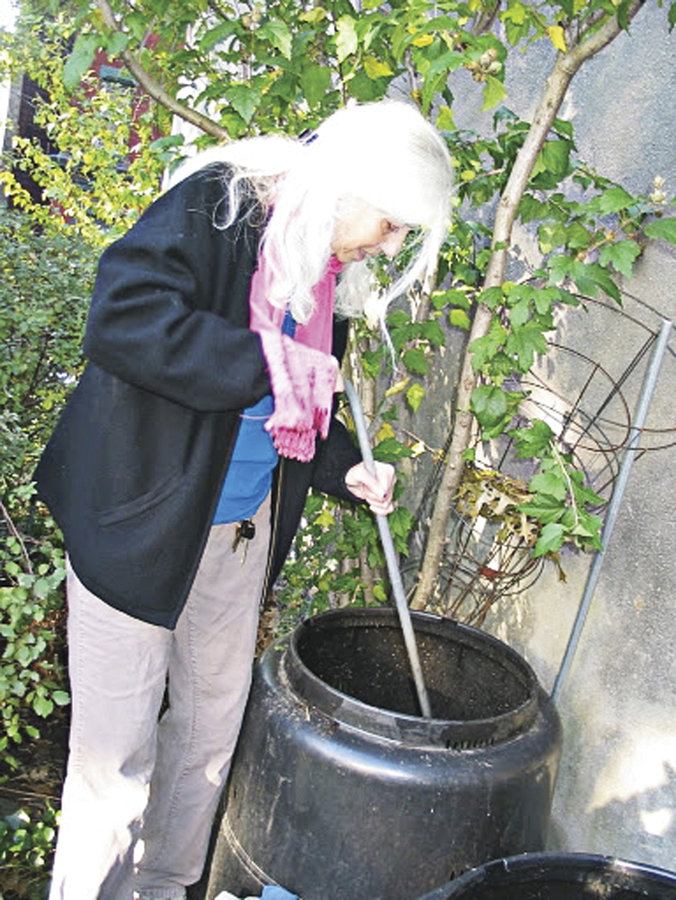Hudson County residents who want to turn some of their garbage into soil – but lack the space or the backyard to do it and have few drop-off locations – may be in for a change.
The process is called “composting” and it’s popular among local gardeners, as well as Manhattan transplants accustomed to repurposing their food scraps at places like the Union Square farmers market. Now, compost options in Jersey City may be about to bloom.
Urban decay, the good kind
Not all trash is compostable. The process involves collecting food scraps such as fruit peels, eggshells, coffee grinds, and vegetable discards, and combining them with dried leaves and newspaper to allow the natural, organic process of decay to create nutrient-rich soil called compost.
The soil produced by composting natural materials can then be used as fertilizer for house plants or gardens.
People compost for a variety of reasons: reducing overall waste, recycling food waste that returns nutrients like carbon and nitrogen back to depleted soil, and producing nutrient-rich soil for gardening.
“I’m looking for greens.” – Elizabeth Onorato
____________
“It is phenomenal the end product you get,” said Rich Budinich, recycling coordinator at the Hudson County Improvement Authority. He composts and uses the soil for his own garden.
“It is great stuff. Great to put compost in one’s garden or offer it up to one’s neighbors.”
“I have a garden and I needed some nutrients for my soil,” said Jersey City resident Elizabeth Onorato about why she composts. “It is the easiest way of getting nutrients.”
Onorato has lived in Jersey City since 1988. A graphic designer/artist with a green thumb, she leads workshops on how to compost through the Bokashi fermentation method and also has two compost bins of her own that she uses year round.
“It feels so good because [the food waste] is not going into the landfills,” she said. “You are just re-using everything. I actually sweep up the neighbors’ yards. I take everybody’s leaves.”
All for dirt
Urbanites with limited or no outdoor space or small apartments can compost at home through various methods, such as fermentation like the Bokashi method, vermicomposting with worms, using electric composters, or collecting food scraps for drop off at neighborhood gardens or farmer’s markets.
“It is not as easy as people think,” said Budinich. “You have to take care of it properly for it to decompose properly and quickly. There is nothing worse than compost that is not maintained.”
Onorato fluffs and turns her compost every other day, which she said is sometimes not enough.
But even if you create your own soil at home, where can you drop it off in Jersey City or in Hudson County?
What to do with your food scraps
“We don’t have a facility where people can drop off their food waste,” said Budinich. “We are planning that in the near future.”
Budinich said that the HCIA is waiting for areas under construction to be completed to make plans for other projects like a compost drop-off area. While the county doesn’t offer a place to compost food scraps, it does compost dried leaves from the fall and winter months.
“We are encouraging composting for Hudson County residents who have backyards for their own use,” said Budinich. HCIA sells an Earth Machine compost bin at a discounted rate of $30 and has sold up to 200 bins. The compost bin, which is 30 inches high and 36 inches wide with an open bottom, must be placed on top of earth.
Some individuals who don’t have backyards join community gardens that offer a plot of land and space for compost. However, most gardens don’t accept compost from non-members.
“Since there is growing interest in composing citywide, our board will have to decide on a detailed policy before we start the 2012 gardening season,” said Beverly Brown Ruggia from the Riverview Community Garden on Ogden Avenue next to Riverview-Fisk Park. She said the Riverview garden will consult and work with the city, the Parks Department, and other parks and gardens to come up with a workable program and help create a network of compost drop off sites in Jersey City.
“But our participation will depend entirely on the resources we can gather, the capacity of our compost bin and the volunteer power to manage the material collection and proper care of the composting process,” said Brown Ruggia.
Starting a neighborhood exchange
In the meantime, Onorato plans to start an exchange between gardeners with space to compost and apartment dwellers that want a place to drop off compost.
“I’m looking for greens,” she said.
She currently has plenty of brown leaves, which provide carbon, but her compost requires a mixture of equal parts dried, brown leaves, and green discards.
If you would like to be part of the exchange, contact Elizabeth Onorato at e.onorato@verizon.net.
To order your own compost bin call the HCIA at (201) 795-4555 and ask for the recycling department. Residents can arrange to get the bin from a storage facility in Lincoln Park, or if the park is closed, have it delivered to their home.
Adriana Rambay Fernández may be reached at afernandez@hudsonreporter.com.
SIDEBAR:
Good compost ingredients
Not all trash can become compost.
A mixture of nitrogen-rich green items and carbon-rich brown items makes for a good compost combination. Some mix one part nitrogen to three parts carbon but others use equal parts. During the winter, the decay process slows down. But by spring time you should have nutrient-rich soil. The compost requires regular turning and some moisture.
What goes in: Greens: Coffee grounds, egg shells, tea bags, fruit and vegetable scraps, houseplant or flower cuttings.
Browns: Shredded newspaper, paper napkins, stale bread, coffee filters, dried brown leaves, cardboard, hair, dryer lint.
What stays out: Anything with oils, fats, or grease, sauces, any pet waste, cheese, milk, meat, fish, bones, potatoes, or chemically treated wood.
